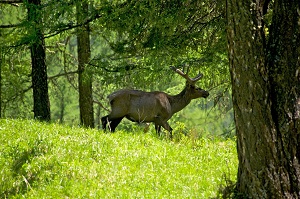Please activate JavaScript in your browser to use all interface options.
Scientists identify favourable habitats for red deer in Evenkia
13 October 2023
As part of Rosneft's biodiversity conservation programme, scientists from the Tungusky State Nature Reserve determined the dependence of red deer migration on forage and safety conditions. The research was supported by the Company's Vostsibneftegaz subsidiary.
Preservation of the environment for future generations is an integral part of the corporate culture of Rosneft. The Company has a number of comprehensive programmes for the conservation and restoration of natural resources, including ones with use of modern technology.
Marals (red deer) were seen in the taiga of the southern part of the Evenki District of Krasnoyarsk Territory, considered atypical for their habitat. This is the second year scientists have been investigating the combination of factors that allowed the red deer to spread to new territories.
Researchers identified habitats and counted the number of marals using camera traps, tracks and by following the animals during field surveys.
Scientists found that the expansion of the range towards Evenkia became possible due to the availability of food, changes in climatic conditions and snow cover, as well as terrain features. Forest and mountain taiga areas are considered to be the most suitable for the red deer - it is the landscape that provides optimal protection for the species. Each year, the artiodactyls use the same migration trails. For example, one of the 10 kilometre crossings is between the Upper Lakura and Chamba rivers. Environmental scientists estimate that up to 300 red deer may live on the territory of the reserve.
Adaptability to new territories is one of the most important features of the conservation of the red deer population. Specialists concluded that the maral is exploring the entire available territory of the reserve and the adjacent area.
The materials of scientific research will contribute to the conservation of a new species of reindeer in Evenkia.
Note for Editors:
The East Siberian Oil and Gas Company, a subsidiary of Rosneft Oil Company, develops the Yurubcheno-Tokhomskoye oil and condensate field in the Evenki district of the Krasnoyarsk Territory.
Supporting the culture and traditional way of life of the indigenous people of Evenkia is one of the key lines of the social work of the company. During the years of the work in the region, Vostsibneftegaz has implemented a lot of social, charity and research programmes.
The Vostsibneftegaz grant programme has been in place since 2014. During this time, the enterprise has supported 26 scientific projects, including projects to study the population of wild reindeer, Siberian sable and lesser white-fronted goose, to preserve the Evenki language, to study the ecosystems of the Tungusky reserve, to develop the first Red Book of Evenkia and to design a biotechnology for artificial reproduction of Siberian taimen.
Implementation of the grant schemes helps save the unique natural environment, traditional way of life and cultural authenticity of indigenous population of Evenkia.
Rosneft
Information Division
October 13, 2023

-315xx70.png)

